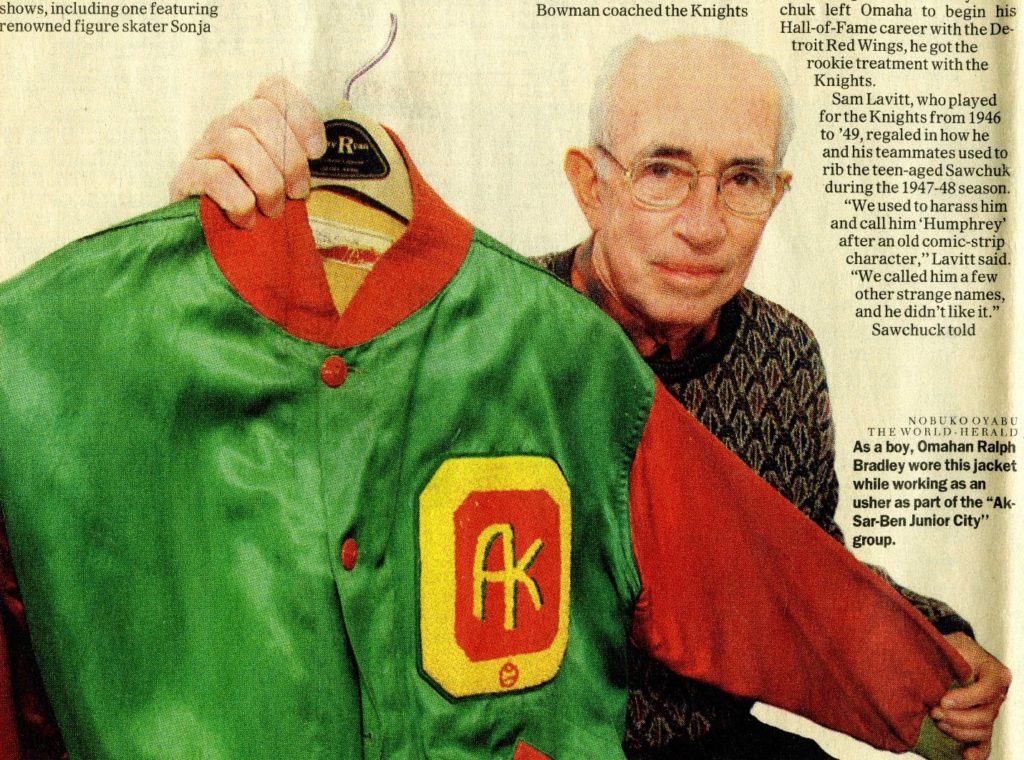By Natalie Kammerer
This week, we wanted to do another highlight of an object in our collection, because it’s a great example of how one item can lead to a whole story with various levels of historical significance.
Ralph H. Bradley was born in Missouri but spent the majority of his life in Omaha. He graduated from Benson High school (class of 1942) and enrolled at the University of Nebraska. World War II had of course already begun, and he enlisted in the Reserves in the winter of 1942. He ultimately served as a B-17 bombardier, completing 31 missions and receiving several medals for service and valor. He retired as a Lieutenant Colonel in the Air Force Reserve, where he was also President of the 100th Bomb Group.

Left: Ralph Bradley in WWII uniform, c. 1943. Image source: https://www.legacy.com/us/obituaries/omaha/name/ralph-bradley-obituary?id=5300020
Right: Ralph Bradley’s senior photo, Benson High yearbook, 1942. Courtesy of Douglas County Historical Society.
Upon his return from the war, Bradley graduated from Creighton University and began a successful career in journalism and communications. He worked for newspapers in Iowa and Wyoming and was the editor of the Sun newspapers in Omaha. He worked in communications for both the University of Nebraska-Omaha and the University of Nebraska-Lincoln and then served as Director of Public Information for the Omaha Public Schools until his retirement.[1]
The Douglas County Historical Society received a number of objects from the Ralph and Barbara Bradley estate, including elements of Bradley’s Air Force uniform and a red and green Ak-Sar-Ben jacket. In addition to his impressive military service, Bradley had also been part of an interesting little slice of Omaha history called the Ak-Sar-Ben Junior City. At first glance, it looks like a team jacket or a high school letter jacket, but it’s actually something much more unique.

Growing up in the neighborhood near Ak-Sar-Ben Field, Bradley, and his friends were constantly sneaking into shows, circuses, and sporting events on the grounds. As he later recalled: “We knew the gaps under the fence; we knew which doors could be easily opened; we knew which windows had no locks (although climbing walls to get to them was dangerous); we knew how to slip in when all of the old ways were barred.”[2]
But one night, the field police caught a group of the boys and were ready to arrest them. Luckily for them, the executive director Jake Isaacson stepped in in the hope of finding another solution. In order to keep the boys out of trouble and allow them free admission to the shows, he gave them a job to do: help protect the field from “toughs from other parts of town.” As Bradley remembered it, Isaacson said, “Many of the men who are running Ak-Sar-Ben Field were once boys doing the same things you are doing. And someday you may be some of the men running Ak-Sar-Ben. You will be protecting property that really belongs to the people of this community.”[3] And with that, the Ak-Sar-Ben Junior City Club was formed. In hindsight, Bradley noted that “the privileges…far outweighed the duties:” Jake Isaacson ended up taking the club’s 25 or so members under his wing, giving them a clubhouse to take care of and hold meetings in. They worked out and enforced their own rules. They had their own baseball team. And Jake Isaacson bought them all matching club jackets that they wore to identify themselves at Ak-Sar-Ben events.
About 25 years later, Bradley noted with pride that all of the boys (with the reported exception of one who moved out of the neighborhood and “away from the influence of the club”) grew up to be upstanding members of the community as florists, military men, engineers, artists, and more.[4]
Though the club came to an end in 1941 as many of the boys were graduating high school, both Bradley and Isaacson expressed the sentiment that, though the club likely didn’t prevent any kind of damage to the field, its existence did help the boys “learn a sense of values and a sense of responsibility.”[5]

Yet another layer of local history: those Ak-Sar-Ben Junior City jackets were made locally by Omaha company Wright and Wilhelmy, the subject of one of last month’s blogs: http://douglascohistory.org/wright-wilhelmy-co/!

[1] “Ralph H. Bradley.” Omaha World-Herald Obituary. June 29, 2010. https://www.legacy.com/us/obituaries/omaha/name/ralph-bradley-obituary?id=5300020.
[2] Bradley, Ralph. “Jake Isaacson Had His Own Method With Boys.” Omaha Sun Newspaper. March 14, 1963. p. 21A.
[3] Ibid.
[4] Ibid.
[5] Ibid.
